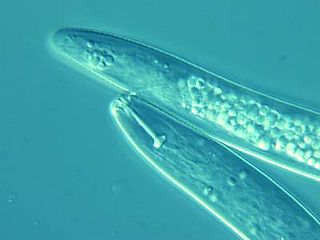Pratylenchus pratensis is a plant pathogenic nematode.

Pratylenchus coffeae is a plant-pathogenic nematode infecting several hosts including potato, banana, sweet potato, strawberry, Persian violet, peanut and citrus.
Pratylenchus goodeyi is a plant pathogenic nematode infecting bananas. It is native to the mountainous regions of Africa. There it is considered the second most devastating nematode after R. similis, especially under poor management.
Pratylenchus brachyurus is a plant parasitic nematode.

Pratylenchus penetrans is a species of nematode in the genus Pratylenchus, the lesion nematodes. It occurs in temperate regions worldwide, regions between the subtropics and the polar circles. It is an animal that inhabits the roots of a wide variety of plants and results in necrotic lesions on the roots. Symptoms of P. penetrans make it hard to distinguish from other plant pathogens; only an assay of soil can conclusively diagnose a nematode problem in the field. P. penetrans is physically very similar to other nematode species, but is characterized by its highly distinctive mouthpiece. P. penetrans uses its highly modified mouth organs to rupture the outer surface of subterranean plant root structures. It will then enter into the root interior and feed on the plant tissue inside. P. penetrans is considered to be a crop parasite and farmers will often treat their soil with various pesticides in an attempt to eliminate the damage caused by an infestation. In doing this, farmers will also eliminate many of the beneficial soil fauna, which will lead to an overall degradation of soil quality in the future. Alternative, more environmentally sustainable methods to control P. penetrans populations may be possible in certain regions.

Pratylenchus neglectus is a plant-pathogenic nematode infecting potato, alfalfa and mint.
Pratylenchus vulnus is a species of plant pathogenic nematode best known for infecting Persian walnut. It is also known to infest potatoes, apricots, peaches and nectarines, holiday cacti, grape and citruses.
Pratylenchus scribneri is a plant pathogenic nematode. It is one of the major plant-parasitic nematodes infecting potatoes.
Thorne's meadow nematode is a plant pathogenic nematode.
Pratylenchus crenatus is a plant pathogenic nematode infecting potatoes.
Pratylenchus flakkensis is a plant pathogenic nematode.
Pratylenchus fallax is a plant pathogenic nematode.
Pratylenchus dulscus is a plant pathogenic nematode infecting almond trees.
Pratylenchus loosi is a plant pathogenic nematode infecting tea.
Pratylenchus minutus is a plant pathogenic nematode infecting pineapples.
Pratylenchus mulchandi is a plant pathogenic nematode infecting pearl millet.

Pratylenchus is a genus of nematodes known commonly as lesion nematodes. They are parasitic on plants and are responsible for root lesion disease on many taxa of host plants in temperate regions around the world. Lesion nematodes are migratory endoparasites that feed and reproduce in the root and move around, unlike the cyst or root-knot nematodes, which may stay in one place. They usually only feed on the cortex of the root. Species are distinguished primarily by the morphology of the stylets.
Butte is a potato cultivar that was released in 1977.
Pratylenchus alleni is a migratory endoparasitic nematode, living inside of plant roots and feeding on parenchyma cells in the root cortex. P. alleni is an obligate biotroph, meaning it must have a living host in order to survive. Due to their incredibly broad host range, Pratylenchus species fall third in total economic impact, finishing just behind cyst nematodes and root knot nematodes (Meloidogyne). In Canada, it was isolated for the first time in 2011 in a soybean field.



